KATHMANDU- Everyone is looking forward to the election for the President because it will be a very important moment for the current ruling alliance. Above all, the vote will determine whether or not Nepal has political stability. It will also demonstrate the fundamentals of political morality.
The upcoming election will clear doubts about the present coalition’s lifespan and other crucial issues. The Election Commission is preparing to hold the crucial vote within 11 Feb, as the term of President Bidya Devi Bhandari ends on 13 March.
Article 63 of the Constitution has fixed a five-year term for the president and vice-president.
The vote is likely to go smoothly with the ruling coalition expected to give its unanimous vote, as it did in the election for the Speaker and the Deputy Speaker.
The ruling coalition had a solid majority to run the government, but Prime Minister Puspa Kamal Dahal’s quest for broader support has complicated matters, increasing suspicions between the two major communist parties—the CPN-UML and the CPN (Maoist Center). Let’s expect the PM to realize sooner than later the important role of CPN-UML Chair KP Sharma Oli in giving shape to the Dahal-led government.
Things have been moving so far according to their initial understanding. The Maoist party voted for the UML candidate for the Speaker, Devraj Ghimire, and the Deputy Speaker was also chosen on the basis of the same understanding.
The seriousness within the coalition was also manifested through a smooth expansion of the Cabinet. New faces making it to the Cabinet has imparted a positive message. Despite popularity tactics on their part, some ministers have been enjoying the ‘benefit of the doubt’ thus far. Let’s wait at least for 100 days.
This article is primarily concerned with the role of the major ruling party, CPN UML, in the success of the Dahal-led government.
KP Sharma Oli, CPN-UML chair, is the kingmaker of this coalition government, so he will do everything in his powers to keep the coalition intact. The UML leadership will not tolerate any act against established norms vis-a-vis this coalition, so PM Dahal should rest assured that the UML will provide him full support.
According to a senior UML leader, fracturing the electoral coalition—comprising the Nepali Congress, the Maoist party and other fringe parties—was his party’s greatest triumph. “We were able to destroy an electoral alliance formed for the benefit of select leaders,” he said.
“This government is better for the country and the people. At the very least, new faces have entered the cabinet and offered a glimmer of hope.”
The idea behind this coalition is that every member of the UML, from local to central, contributes to the viability of the coalition.
Also, the UML leadership will provide strong support to the prime minister in implementing the agreements and decisions reached within the framework of the coalition. There may be rounds of discussions during policy formulation, but once finalized, all parties are required to follow these political decisions.
Another strategy of the UML is to create an environment that is particularly conducive to the prime minister and ministers. As the head of the cabinet, the PM should have complete authority over decisions pertaining to the ministries. The UML leadership will not seek a mirror image in Cabinet leadership. It is not acceptable. Each leader’s working style is unique, and no one should impose their approach on others. Dahal is in his third term as prime minister and is noted for his unique working style. The UML ministers must not associate him with Oli or other leaders.
This regime is not only the result of Nepali Congress President Sher Bahadur Deuba’s deceitful actions. Dahal is more than Deuba’s replacement as prime minister. This coalition reflects the people’s feelings and sentiments. New parties and individuals have been well-represented in the Cabinet. If this arrangement fails to deliver, it will be very unfortunate for the country and the people.
It is hoped that the importance of this arrangement has dawned on the Rastriya Swatantra Party and Rastriya Prajatantra Party. Rather than worrying about support from coalition partners, including the UML, the PM should focus on delivering good governance, which he has outlined as his government’s policy priority. Action-based initiatives and new policies are required to achieve this.
The PM has a majority; he should not be anxious about whether or not the Nepali Congress will back him. His major task is to win the trust of the ruling parties. None of the ruling coalition parties will betray him. The prime minister will be deceiving himself if he continues to harbor doubts about the intent of the coalition partners. Oli is widely seen as a capable leader, who has a development vision and programs for Nepal. It would be beneficial for Dahal to share expertise and experiences with Oli.
It should be noted that Oli will succeed Dahal as PM after two-and-a-half-years. Supporting Dahal fully for the first half of a five-year premiership is expected to result in the same level of support from Dahal for Oli’s premiership. If Oli and Dahal are thinking about the country, this partnership should endure at least five years.

